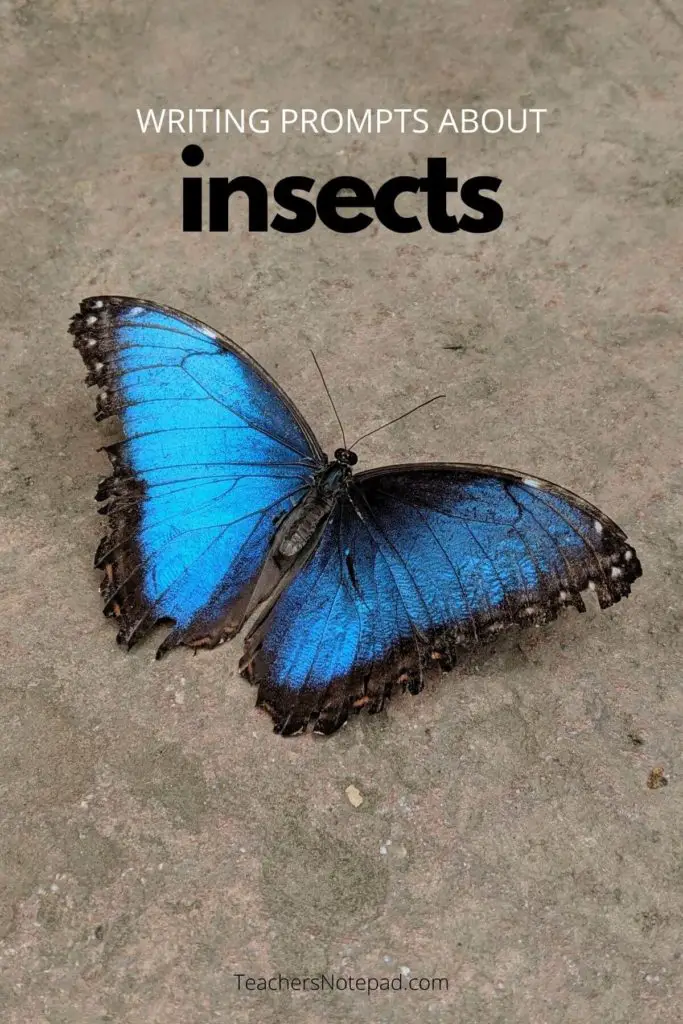You can hear it already, a room full of students screaming about an insect.
But, why should they be so uncomfortable around a simple bug?
The truth is that they shouldn’t and by using writing prompts they can be more open to learning about and understanding insects.
How To Use These Prompts
These writing prompts are great for a unit on insects.
Whether you spend part of a series of days on them or go back to them once a week, these are effective in getting children to think over time.
You may also want to consider a group talk on everyone’s answers, as this will open students up to new ideas.
The Prompts On Insects:
Here are the 31 writing prompts to inspire some interesting writing!
- Do you like bugs? Why or why not?
- If you had to be in a room with one thousand bugs, which bug would you want those thousand to be?
- What are the things that make an insect qualify as an insect?
- How is a spider different from an insect?
- What is your favorite bug? Why?
- Why are bugs important to the world? Are some bugs important for different reasons than others?
- Have you ever known someone who owned an ant farm? What did you think of it?
- Ants can carry weights of up to 5,000 times more than their body weight. That’s the equivalent of a 200lb adult lifting something that weighs 5 tons. Why are ants so strong?
- Are you scared of bugs? Why or why not?
- Do you think bugs have emotions or feel pain? Why or why not?
- Do you feel differently about insects that can fly from insects that can’t? Why?
- If you turned into a bug, what would you do? Why?
- What is the first thing that you do when you see a bug inside the house? Why?
- What makes dung beetles important?
- If all animals serve a purpose in the ecosystem, what purpose do mosquitoes serve?
- Ladybugs are known to eat other bugs. This makes them popular with farmers who keep them around, rather than using a chemical parasite on their plants to prevent other bugs from eating the crops. Why do they prefer to use ladybugs than chemicals for this purpose?
- Bee populations are dying out, which is bad because without bees, many ecosystems would collapse and there would be food shortages. This is because they pollinate plants, which is necessary for those plants to grow. How can we help to make sure bees are healthy and strong?
- Butterflies are a type of insect. Why is it that most people feel differently about them than other insects?
- Experts say there are about 5 million species of insects in the world, but we only know of about 1 million. What would you do if you discovered one of the 4 million species of insects that aren’t discovered yet? Who would you tell? What would you name it?
- Design your own insect. What does it look like, how big is it, and what makes it special?
- Do you know why an insect has an antenna? If not, why do you think?
- Weevils, dragonflies, and mosquitoes are among the insects alive at the same time as dinosaurs. Why do you think they didn’t go extinct with the dinosaurs? What would it have been like to be an insect when the meteor hit the Earth that killed the dinosaurs?
- Many insects show social behavior, living together in colonies. Why do you think this is?
- Why do fireflies, which are sometimes called lightning bugs, flash in the night?
- What are some ways that mosquitoes protect themselves from predators?
- In many parts of the world, insects like crickets are eaten as an important source of protein. Would you ever eat a bug?
- Silk is a fine material in a lot of expensive clothing, and it comes from an insect called the silkworm. Does this change how you feel about silk as a material?
- Which bug is most important? Why?
- Why do people, called entomologists, study insects?
- If you could be any insect, which would you be?
- Would you ever keep a bug as a pet? Why or why not?
Want more writing resources?
For more information and resources for teachers, please take a look through the rest of our website, which is definitely shareable with friends and colleagues. Hint hint, nudge nudge 😉
I think you’d also find our prompts about bees, and national parks interesting…
If there is any information missing or that you would like to see, please feel free to reach out to us.


